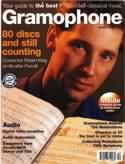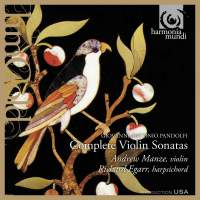Texte paru dans: / Appeared in:
|
|
|
Outil de traduction (Très approximatif) |
|
|
Reviewer:
Nicholas Anderson It would seem almost as if Andrew Manze had acquired proprietorial rights over the violin sonatas of Giovanni Antonio Pandolfi, or Antonio Pandolfi Mealli , as he called himself in the earlier of the two collections presented here. In 1994 Manze recorded a selection of sonatas from Pandolfi's Op. 3 and Op. 4 , both dating from 1660 and both printed in Innsbruck (Channel Classics, 7/94); and last year he included another, from Op. 4 in a mixed recital with the group Romanesca (Harmonia Mundi , 7/98). Now come the two sets, each containing six sonatas, in their entirety. But it is not correct to describe the contents of the disc as Pandolfi's 'Complete Violin Sonatas' since there are four more for solo violin and continuo in a third collection issued in Rome in 1669.
These are virtuoso performances of some quite extraordinary music. Each sonata has its own descriptive subtitle and a movement layout which seems reluctant to conform to any set pattern. Presumably the sections have their own tempo indications, though these are not disclosed either in the booklet or in the listing on the reverse side of the box. A pity, since there are lots of interesting and unusual juxtapositions of a strikingly non-conformist nature. Much of the writing is characterized by virtuoso figurations which, especially in faster movements, might become a little wearisome in the hands of a lesser player. But Manze seems to sense this danger and averts it with panache and a highly developed sense of fantasy. Slow movements, on balance, are more interesting and there is an especially memorable one in La Clemente, the Fifth Sonata of Op. 3, whose aria-like character is pathos-laden . Manze plays it sensitively and the result is touching. Several movements have a s trong ostinato element and, in La Monella Romanesca, the third piece from Op. 4 , we have a set of variations on a melody contained in the bass. Harpsichordist Richard Egarr is a lively and an imagi native accompanist throughout.
In short, an exhilarating recital
of music whose exoticism, melancholy and wild, passionate outbursts resist both
categorization and convenient definition. Uccellini, certainly, but also even
Schmelzer and Biber seem at times conservative by comparison. |
|
|
|
|
|
Cliquez l'un ou l'autre
bouton pour découvrir bien d'autres critiques de CD |
|




